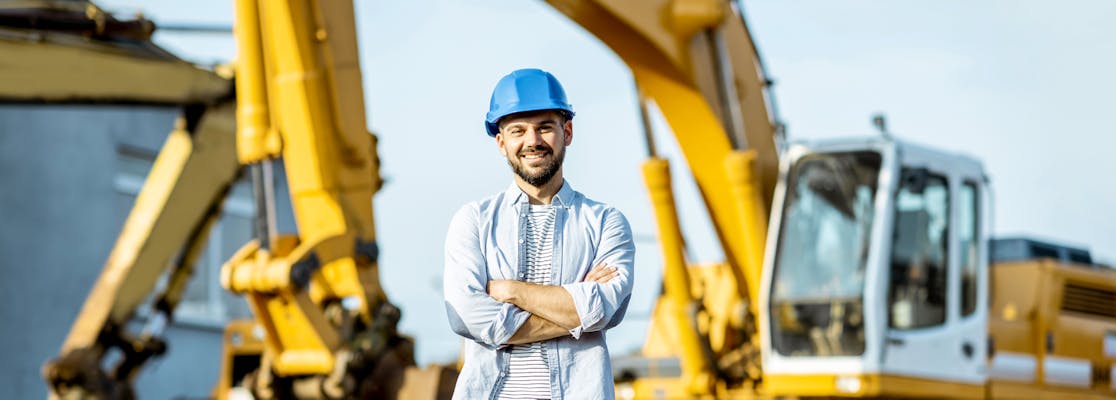How Many Jobs Are Available in Industrial Machinery/Components?
Updated November 20, 2023
- What Is the Industrial Machinery/Components Industry?
- What Sectors Does the Industrial Machinery/Components Industry Serve?
- How Many Jobs Are Available in Industrial Specialties?
empty
empty
empty
empty
empty
empty
empty
empty
empty
empty
empty
empty
empty
empty
- What Are The Best Paying Jobs in Industrial Machinery Components?
empty
empty
empty
empty
empty
empty
empty
empty
- What Skills and Qualifications Are Required To Work in The Industrial Machinery/Components Industry?
empty
empty
empty
empty
empty
empty
empty
empty
empty
- Frequently Asked Questions
- Final Thoughts
The industrial machinery components industry is a diverse and dynamic sector that is pivotal in various aspects of modern life.
Its constant evolution and adaptation to new technologies make it a significant economic growth and innovation driver.
In this article, we will discuss the role of the industrial machinery/components industry, what jobs are available and if it is a good career path.
What Is the Industrial Machinery/Components Industry?
The industrial machinery/components industry, a vital cog in the global economic wheel, spans an extensive spectrum of businesses dedicated to the design, manufacturing, distribution, and maintenance of machinery, equipment, and components essential to several sectors.
These pivotal sectors encompass manufacturing, construction, agriculture, energy, and transportation.
While industry giants like Caterpillar, Siemens, General Electric, and Komatsu are dominant forces, smaller specialized companies carve out significant niches, bringing innovation and expertise to specific markets.
As we look to the future, employees in this arena can anticipate a landscape ripe with technological advancements, sustainability-driven shifts, and evolving manufacturing practices.
Such progress will likely introduce new roles, demand upskilling, and offer opportunities for innovation and growth in both established corporations and emerging startups.
The industry operates globally, with supply chains extending across borders.
Components and machinery are often manufactured in one part of the world, assembled in another, and distributed globally.
What Sectors Does the Industrial Machinery/Components Industry Serve?
- Construction – Heavy equipment and machinery are used for building infrastructure
- Agriculture – Farm machinery enhances productivity in the agriculture sector
- Energy – Equipment for power generation and distribution is a crucial part of energy infrastructure
- Transportation – Industrial machinery contributes to the production of vehicles and transportation systems
How Many Jobs Are Available in Industrial Specialties?
If you are wondering what industrial jobs are presently available, the industrial machinery/components industry offers various job opportunities across various sectors and functions.
Here are some of the key types of jobs in this industry:
Engineering and Design
- Mechanical Engineers – Responsible for designing, testing and improving mechanical systems and components
- Electrical Engineers – Focus on the design and maintenance of electrical and electronic systems used in machinery and/or heavy machinery
- Industrial Designers – Create the visual and ergonomic aspects of machinery and components, ensuring they are user-friendly and aesthetically appealing
Manufacturing and Production
- CNC Machine Operators – Operate computer numerical control (CNC) machines to manufacture precision components
- Assembly Line Workers – Assemble and test machinery and components on production lines
- Quality Control Inspectors – Ensure that products meet quality standards by inspecting and testing components and machinery
Sales and Marketing
- Sales Representatives –Promote and sell industrial machinery, components, and services to clients and customers
- Marketing Specialists – Develop marketing strategies, conduct market research and create promotional materials for the industry
Maintenance and Repair
- Maintenance Technicians – Perform routine maintenance and repair work on machinery and equipment to keep them operational
- Field Service Engineers – Travel to client sites to diagnose and repair machinery or provide technical support
Research and Development (R&D)
- Research Scientists – Engage in innovative research to develop new technologies and improve existing products
- Product Development Engineers – Collaborate with cross-functional teams to design and develop new machinery and components
Project Management
- Project Managers – Oversee large-scale projects involving the installation, commissioning, or modification of industrial machinery and systems
- Production Managers – Manage manufacturing operations, ensuring efficient production processes and timely delivery
Supply Chain and Logistics
- Supply Chain Managers – Coordinate the movement of raw materials, components, and finished products throughout the supply chain
- Logistics Coordinators – Manage transportation and distribution of machinery and components to customers
Environmental Health and Safety (EHS)
- EHS Specialists – Ensure compliance with safety and environmental regulations within the industry, promoting a safe working environment
Technical Support
- Technical Support Engineers – Provide technical assistance to customers and internal teams, helping troubleshoot issues and optimize machinery performance
Customer Service
- Customer Service Representatives – Assist customers with inquiries, orders and after-sales support for machinery and components
IT and Software
- Software Developers – Create and maintain software solutions for machinery control, automation, and data analysis
Procurement and Supply Management
- Procurement Specialists – Manage the sourcing and procurement of materials and components for manufacturing
Training and Education
- Technical Trainers – Educate employees and customers on the proper use, maintenance, and troubleshooting of machinery
Administration and Management
- Administrative Personnel – Handle administrative tasks, such as payroll, human resources and office management
- Middle and Senior Management – Lead various departments and functions within industrial machinery/component companies
These job types represent a diverse array of career opportunities within the industrial machinery/components industry, each contributing to the design, production, distribution and maintenance of machinery and components used across multiple sectors of the economy.
What Are The Best Paying Jobs in Industrial Machinery Components?
Remember that the specific skills and qualifications required can vary widely based on the job role, the sector within the industrial machinery/components industry and regional or company-specific preferences.
Tailoring your skills and qualifications to match the specific job requirements is key to success in this field.
The best-paying jobs in the industrial machinery/components industry can vary depending on factors such as job role, level of responsibility, location and the specific company.
However, here are some of the highest-paying roles within this industry according to the bureau of labor statistics:
Engineering Managers
- Responsibilities – Engineering managers oversee engineering teams, coordinate projects and ensure technical objectives are met
- Qualifications – A bachelor's or master's degree in engineering, extensive experience, and strong leadership skills
- Salary – Engineering managers often earn high salaries due to their technical expertise and managerial responsibilities
Research and Development (R&D) Directors
Responsibilities
R&D directors lead innovation efforts, develop new products and guide research teams.
- Qualifications – A background in engineering or a related field, extensive experience in R&D and strong leadership abilities
- Salary – R&D directors are compensated well for their role in driving innovation and product development
Manufacturing Plant Managers
- Responsibilities – Plant managers oversee manufacturing operations, ensuring efficiency, quality and safety
- Qualifications – A combination of technical knowledge, management experience, and often a bachelor's or master's degree
- Salary – Plant managers are typically well-paid due to their responsibility for the overall manufacturing process
Industrial Sales Managers
- Responsibilities – Sales managers lead sales teams, develop strategies and build relationships with clients
- Qualifications – Sales experience, strong communication skills and a track record of meeting sales targets
- Salary – Sales managers can earn high salaries, often with performance-based incentives

Automation Engineers
- Responsibilities – Automation engineers design, implement and maintain automated systems and machinery
- Qualifications – A bachelor's degree in engineering, automation expertise, and knowledge of control systems
- Salary – Automation engineers are in demand due to the growing importance of automation in manufacturing
Control Systems Engineers
- Responsibilities – Control systems engineers design and maintain control systems for industrial machinery
- Qualifications – A degree in engineering or a related field, expertise in control systems and programming skills
- Salary – Control systems engineers are well-compensated for their technical expertise
Quality Assurance Managers/Directors
- Responsibilities – QA managers oversee quality control processes, ensuring products meet industry standards.
- Qualifications – A background in quality control, managerial experience, and knowledge of quality management systems
- Salary – QA managers can earn high salaries due to their role in ensuring product quality.
Research Scientists
- Responsibilities – Research scientists conduct research to develop new technologies and improve existing products
- Qualifications – A PhD or advanced degree in a relevant field and a strong research background
- Salary – Research scientists can earn competitive salaries in industries focused on innovation
Project Managers
- Responsibilities – Project managers lead and coordinate industrial machinery and component projects
- Qualifications – Project management experience, often with certifications like PMP (Project Management Professional)
- Salary – Project managers are compensated well for their role in ensuring project success
It's important to note that salary levels can also vary based on factors such as geographic location, company size, industry sector and the level of experience of the individual.
Additionally, salaries can change over time due to economic conditions and industry trends. As such, it's essential to research your area's specific job market and industry trends to understand the current salary ranges for these roles.
What Skills and Qualifications Are Required To Work in The Industrial Machinery/Components Industry?
Working in the industrial machinery/components industry requires a combination of technical knowledge, practical skills and relevant qualifications.
The Industrial Machinery/Components industry, like many others, is in a state of flux due to technological advancements, digitization, and evolving manufacturing practices. As the industry evolves, professionals need to adapt by acquiring new skills.
The specific skills and qualifications needed may vary depending on the job role and sector within the industry.
Here are some common skills and qualifications required:
Educational Requirements:
- High School Diploma – It's entirely possible to secure a job in the Industrial Machinery/Components industry with just a high school diploma. However, the types of positions available might be more limited compared to those with specialized technical or college degrees.
- Bachelor's Degree – Many technical positions, such as engineering and design roles, often require a bachelor's degree in a relevant field. Common degrees include mechanical engineering, electrical engineering, industrial design and manufacturing engineering.
- Advanced Degrees – Some roles, especially those in research and development or management, may benefit from master's degrees (e.g., MSc or MBA) or even PhD qualifications.
Technical Skills
- Mechanical Skills – Understanding of mechanical principles, including mechanics, thermodynamics and materials science.
Electrical Skills
Knowledge of electrical circuits, control systems and electronics.
Computer-Aided Design (CAD)
Proficiency in CAD software for designing machinery and components.
Programming
Familiarity with programming languages (e.g., Python, C++) for controlling automated machinery or developing software solutions.
- CNC Programming – Competence in computer numerical control (CNC) programming for machining operations
- PLC (Programmable Logic Controller) – Ability to program and troubleshoot PLCs commonly used in industrial automation
Data Analysis
Skills in data analysis and interpretation, particularly relevant for quality control and process optimization roles.
Soft Skills
- Problem-Solving – Strong analytical and problem-solving skills to troubleshoot issues and optimize machinery and processes
- Communication – Effective communication is crucial for collaborating with cross-functional teams, customers, and suppliers
- Teamwork – Ability to work well in interdisciplinary teams to achieve project goals
- Project Management – Skills in project planning, organization and execution, particularly relevant for project management roles
- Adaptability – Given the industry's rapid technological changes, adaptability to new tools and techniques is essential
Certifications and Training
- Industry-Specific Certifications – Depending on the role, certifications such as Certified Manufacturing Technologist (CMfgT) or Certified Automation Professional (CAP) may be advantageous
- Safety Certifications – OSHA (Occupational Safety and Health Administration) certifications for workplace safety are often required, especially for maintenance and operation roles
- Machinery and Equipment Training – Many jobs require specific training on machinery and equipment operation, maintenance, and safety
Experience
- Internships and Apprenticeships – Gaining practical experience through internships or apprenticeships can be valuable for entry-level positions
- Industry Experience – Progressive experience within the industry, including roles with increasing responsibilities, can lead to more senior positions
- Regulatory Knowledge – Understanding industry-specific regulations and standards, including safety, quality and environmental regulations, is essential for compliance
- Continuous Learning – Staying updated with the latest industry trends, technologies and best practices through professional development and continuous learning is crucial for career growth in this dynamic field
Frequently Asked Questions
A career in the industrial machinery/components industry can be a rewarding and promising choice for individuals who possess the right skills, interests and career goals.
However, whether it's a 'good' career path for you depends on various factors, including your personal preferences, strengths and aspirations.
Industrial machinery and components refer to a broad category of equipment, machines and parts used in various industrial processes and applications across different sectors.
These components and machinery play a crucial role in manufacturing, construction, energy, transportation and many other industries.
Industrial machinery is used for a wide range of applications across various sectors of the economy. These machines and equipment play a crucial role in manufacturing, construction, energy production, transportation and many other industries.
It often incorporates advanced technologies, automation and precision control systems to meet modern industry demands.
These machines are essential for achieving high productivity levels, quality and consistency across various industrial processes.
Industrial machinery refers to a category of equipment, machines, and mechanical devices that are specifically designed and used for various industrial purposes and applications.
These machines are typically employed in manufacturing, construction, energy production and other industrial sectors to facilitate production, processing and automation of tasks.
The machinery industry is a diverse sector encompassing various types of machinery and equipment designed for specific applications and industries.
These types of machinery industries can be categorized based on the functions they serve and the sectors they primarily support.
Each type of machinery industry serves specific purposes, supports various industrial sectors, and contributes to the global economy differently.
Machinery typically falls under the 'Capital Goods' or 'Capital Equipment' category in economic and industrial classifications.
Capital goods refer to physical assets and equipment used by businesses and organizations to produce goods and services. These goods are considered long-term investments and are used over an extended period to facilitate production.
Capital goods, including machinery, are vital to economic growth and development. They enable businesses to increase productivity, improve efficiency and expand production capabilities.
Investments in capital goods are often seen as indicators of economic health and industrial development, as they contribute to the growth and competitiveness of industries and businesses.
The terms 'machinery' and 'equipment' are often used interchangeably, but there are subtle differences between the two.
Both machinery and equipment refer to physical assets and tools used in various industries and applications, but they can be distinguished based on their specific functions and characteristics.
While machinery and equipment both refer to physical assets used in various industries, machinery is more specifically associated with complex, mechanical devices that perform specialized functions, often in manufacturing and production processes.
On the other hand, equipment is a broader term encompassing a wide variety of physical tools and assets, including mechanical and non-mechanical items used in a wide range of applications.
The distinction between the two terms can sometimes vary depending on the context and industry in which they are used.
Final Thoughts
The realm of Industrial Machinery & Components offers a vast expanse of career opportunities, catering to diverse skill sets and educational backgrounds. From hands-on roles like machine operators and welders to more technologically advanced positions centered around the integration of AI and Industry 4.0, the sector presents a dynamic and evolving landscape.
The advancements in technology and a global push towards sustainable manufacturing further underscore the need for professionals to embrace continuous learning and adaptability.
Whether you're a fresh entrant into the workforce or a seasoned professional seeking a career shift, this industry promises growth, innovation, and a chance to be part of the backbone of modern manufacturing and production.
As we stand on the brink of yet another industrial revolution, there's arguably never been a more exciting time to delve into the world of Industrial Machinery & Components.





